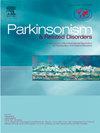Effect of cognitive reserve on cognitive function and cognitive deterioration in Parkinson's disease: a longitudinal cohort study
IF 3.4
3区 医学
Q2 CLINICAL NEUROLOGY
引用次数: 0
Abstract
Background
Previous cross-sectional work has suggested that higher cognitive reserve (CR) is associated with better cognitive performance and slower cognitive decline in Parkinson's disease (PD); however, these findings need confirmation in prospective longitudinal designs. The current study therefore examined how CR influences both cognitive function and the rate of cognitive deterioration in a longitudinal PD cohort.
Methods
This study utilized a prospective, longitudinal design and recruited participants from Tianjin Huanhu Hospital between September 2017–September 2019. PD patients were followed up for clinical assessment at an average of 2 ± 0.6 years.
Results
Higher CR levels were associated with better cognitive performance and reduced cognitive decline over a 2-year follow-up period. Linear regression analysis revealed significant positive associations between CR and the 2-year change rate of Montreal cognitive assessment (MoCA) scores, with age and apolipoprotein E (APOE) genotype being significant predictors. Logistic regression indicated that CR Index (CRI) components (education, working activity, and leisure time) and intelligence quotient (IQ) were independently associated with cognitive decline risk.
Conclusions
The study highlights the importance of CR in mitigating cognitive decline in PD and suggests that interventions to enhance CR could be beneficial for PD patients. Future research should focus on elucidating the underlying mechanisms and developing targeted interventions to support cognitive health in PD.
认知储备对帕金森病认知功能和认知退化的影响:一项纵向队列研究
之前的横断面研究表明,较高的认知储备(CR)与帕金森病(PD)患者更好的认知表现和较慢的认知衰退有关;然而,这些发现需要在前瞻性纵向设计中得到证实。因此,目前的研究在纵向PD队列中检查了CR如何影响认知功能和认知退化率。方法本研究采用前瞻性、纵向设计,于2017年9月至2019年9月在天津市环湖医院招募受试者。PD患者平均随访2±0.6年进行临床评估。结果在2年的随访期间,较高的CR水平与更好的认知表现和减少认知衰退有关。线性回归分析显示,CR与蒙特利尔认知评估(MoCA)评分2年变化率之间存在显著正相关,年龄和载脂蛋白E (APOE)基因型是显著预测因子。Logistic回归分析表明,认知能力下降风险与CR指数(CRI)组成部分(教育程度、工作活动和休闲时间)和智商(IQ)独立相关。结论本研究强调了CR在缓解帕金森病患者认知能力下降中的重要性,并提示提高CR的干预措施可能对帕金森病患者有益。未来的研究应侧重于阐明潜在的机制,并制定有针对性的干预措施,以支持PD患者的认知健康。
本文章由计算机程序翻译,如有差异,请以英文原文为准。
求助全文
约1分钟内获得全文
求助全文
来源期刊

Parkinsonism & related disorders
医学-临床神经学
CiteScore
6.20
自引率
4.90%
发文量
292
审稿时长
39 days
期刊介绍:
Parkinsonism & Related Disorders publishes the results of basic and clinical research contributing to the understanding, diagnosis and treatment of all neurodegenerative syndromes in which Parkinsonism, Essential Tremor or related movement disorders may be a feature. Regular features will include: Review Articles, Point of View articles, Full-length Articles, Short Communications, Case Reports and Letter to the Editor.
 求助内容:
求助内容: 应助结果提醒方式:
应助结果提醒方式:


